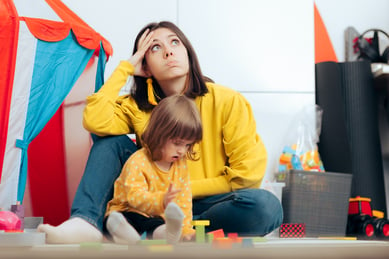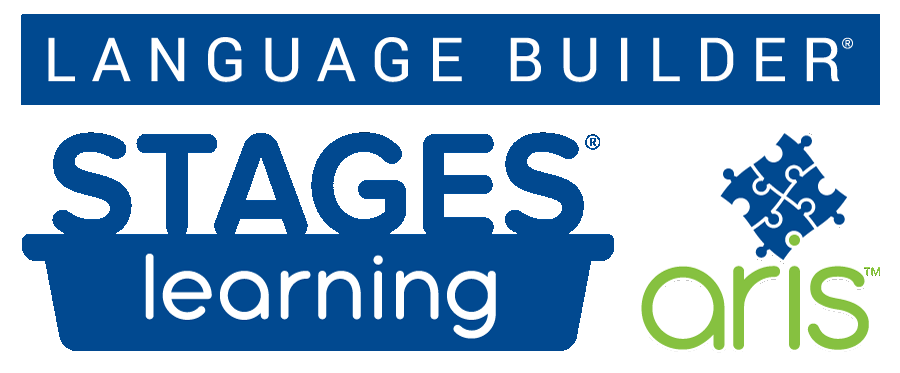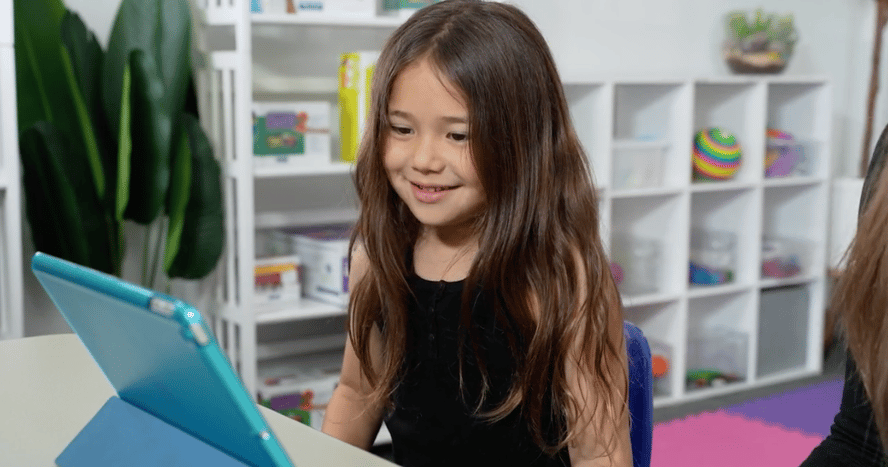
I was an exhausted Mom, nervous and beyond overwhelmed with my toddler sitting (bouncing) wildly on my lap on his knees, singing inaudibly while playing with my earrings as I tended to the cries and wiggles of my infant of 11 months in his baby carrier on the airplane seat next to me repeatedly spitting out his pacifier.
I did my best to listen to the safety guidance presentation by the flight attendant at the front of the plane, but honestly, I missed most of it. I looked up and saw the flight attendant coming my way and I asked myself, “Are we getting kicked off the plane already!?” She approached me holding the model oxygen mask and gave a quick review of the instructions for use and I was grateful that she did so. Her last phrase didn’t sit well with me which was:
“Make sure you put your oxygen mask on first and then apply them on your children.”
My puzzled response was,
“I feel like I should take care of them first since they’ll be losing oxygen while I put on my mask.”
Her response is etched in my memory and changed my entire life perspective. She said to me with a bold Southern accent,
“Honey, if you ain’t breathing first, then they never will!”

Our Basic Survival Needs
We, as humans, all have uniquely individual needs that we alone cannot meet for ourselves. The hierarchy of seven basic survival needs of the body as outlined in a 1943 paper titled "A Theory of Human Motivation" by American psychologist Abraham Maslow, is still generally accepted among the medical community to this day. This hierarchy supports attaining humankind’s quest for happiness. The seven basic needs include:
- Air
- Water
- Food
- Shelter
- Safety
- Sleep
- Clothing
Love/Connection
More recent research suggests that love/connection is a prerequisite to the original 7 basic needs. A professor at the University of Houston Graduate College of Social Work, Brene Brown, has a lifetime of work in the area of social connection. She states, “A deep sense of love and belonging is an irresistible need of all people. We are biologically, cognitively, physically, and spiritually wired to love, to be loved, and to belong. When those needs are not met, we don't function as we were meant to. We break. We fall apart. We numb. We ache. We hurt others. We get sick.”
In one way or another, for every single one of us, there are people in our lives who fit the label of “caregiver” who offer us support as we navigate through life and similarly, we provide support to others in this way. Providing care for those who cannot provide basic needs for themselves, such as autistic individuals, takes this challenge up a level. For families with autistic children, or children with other disabilities, caregiving is necessary on an elevated level and is often a shared responsibility amongst multiple care providers in their social network.
What Is Caregiver Burnout?
The role of caregiving for people with disabilities can become all-consuming as relentless effort is put into providing the best care for loved ones with elevated needs of support. With specialized needs from behavior intervention plans, to bathroom support, speech development, eating sensitivities, and sensory sensitivities to additional health risks associated with their diagnosis and beyond, caregiving for autistic individuals takes a great deal of energy, time, and emotion. 
In this labor of love, it is common for caregivers to experience caregiver burnout including physical, emotional, and mental symptoms including, but not limited to:
- Frequent physical illnesses such as flu or cold
- Physical fatigue
- Feeling irritable, hopeless, and helpless
- Loss of interest in previously preferred activities
- Withdrawal from socializing with family, friends, or social settings
- Weight loss or gain
- Feelings of resentment towards the person being cared for
- Emotional fatigue, causing sadness and depression
- Feeling overwhelmed or inadequate
How Can I Prevent Caregiver Burnout or Find Relief if I Am Already Displaying Symptoms?
While minimal caregiver fatigue is certain to come to all of us providing care for an autistic individual from time to time, to prevent or treat the more severe symptoms of burnout consider the following options for self-care:
-
Contact your primary care physician.
While the symptoms referenced above can be caused by caregiver burnout, it is possible that the symptoms can be attributed to a different underlying medical condition that your doctor can help identify and treat. Many health organizations also understand the health benefits of proactive care and may have local resources to support you if it is caregiver burnout that you are experiencing. -
Set the realistic expectation that caregiver fatigue will find you and that you are susceptible to caregiver burnout.
Your abundance in loving and caring for others, although noble and valuable, does not make you invincible. Recognize and honor that you WILL inevitably need and deserve support too. -
Allow yourself grace and allowance to feel angry, distressed, and fatigued.
You are beautifully human and that includes the beauty of challenging feelings accompanying the weight of the intensive care you are offering your loved one. -
Find a support group or trusted compassionate person for your own emotional support to express your feelings of frustration, stress, or sadness.
Connect with a trusted family or friend to talk about your feelings and frustrations so solutions can be a shared effort with the listener. There are online sites to help with finding an in-person autism support group near your home as well as online support groups. You are not in this alone! -
Find a professional therapist.
Professional counseling can be a more intensive avenue for support in comparison to relying solely upon trusted friends or family. -
Utilize professional respite care services for temporary breaks to ensure self-care.
This may be a quiet coffee break at a cafe alone, a dinner out with your partner, a pedicure/manicure, or whatever it is that allows you to be a friend to yourself. It is healthy to find purpose and joy OUTSIDE the caregiving effort you offer to your loved one. -
Seek out education on autism where the information is offered through a more clinical lens to guide you toward a better understanding of the ins and outs of the challenges you are facing.
For example, denial is a necessary step in grieving the challenges of caregiving, and support groups or organizations that provide education can gently bring you through the steps of grief. A couple of good online resources for autism education are Spark, Dr. Mary Barbera, and Synapse. -
Take care of your own physical needs including healthy eating, increased water intake, exercise, and laughter.
Focus on making mealtimes a time to breathe and enjoy conversation. Drink enough water to help rid your body of toxins. Humor can go a long way to minimize stress through the release of the happiness hormones serotonin and dopamine. “Eat, drink, and be merry” is good self-care advice to live by! Learn more about small steps towards healthy living here.

So, as you are giving your love, energy, time, emotion, physical efforts, and all of the tiny acts of service to care with your whole heart for that special autistic person in your life, please remember to offer care to yourself as well. After all, “honey, if you ain’t breathing first, then they never will!”

.jpg)



